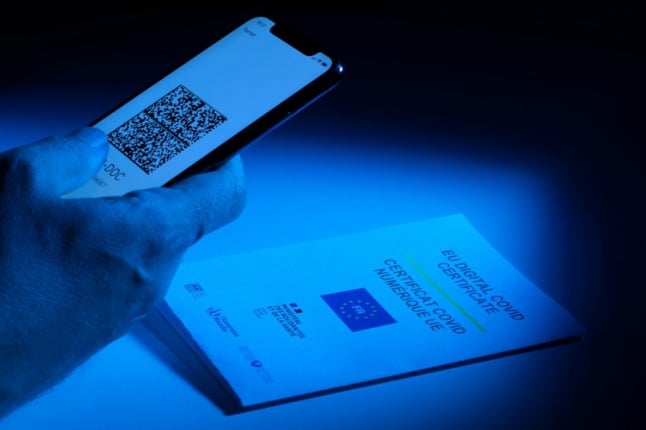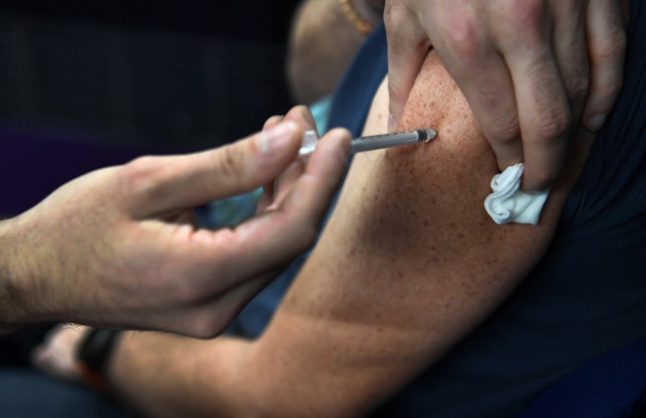In France, Covid health passes are required to enter a wide range of venues including bars, cafés, gyms, cinemas, tourist sites and long-distance trains.
Most people use the TousAntiCovid app on their phones to show their health pass, but paper certificates are also accepted.
Three types of proof are accepted; proof of vaccination, proof of recent recovery from Covid or proof of a negative Covid test less than 24 hours old. In France, where almost 90 percent of the adult population is vaccinated, most people use proof of vaccination.
However from Saturday, January 15th a big change comes into force – people who had their second vaccine dose more than seven months ago will see their pass deactivated if they have not had a booster shot.
This policy came into effect for over 65s on December 15th, and is now expanded to all over 18s. Teenagers aged 12-17 can continue to use their health pass without a booster.
These rules also apply to any tourists, visitors or people vaccinated outside France who wish to use the health pass.
READ MORE 800,000 people in France could see health pass deactivated on Saturday
READ ALSO Are NHS vaccination certificates still valid on the French health pass?
Will my pass deactivate?
The easiest way to see if your health pass will be deactivated is to use the TousAntiCovid app – those who do so will receive an on-screen notification if their pass is set to expire.
You can also double-check by clicking on the “Ouvrir mon carnet” or “Open my wallet” section of the app. If your pass is set to expire, your most recent in-app vaccination certificate will carry a yellow warning informing you of the deadline to get your booster dose.
READ MORE When will my French health pass deactivate?
There is also an online simulator to tell you when your health pass will be deactivated – this is particularly useful for people who do not use the TousAntiCovid app.
This applies only to people who use vaccination certificates for their health pass (although other changes are coming that relate to people who use negative tests, see below).
What if I can’t get my booster because I had Covid?
The Omicron wave struck just as booster shots were opening up to the whole population, so many people ended up catching the virus before they could book a booster appointment.
You become eligible for a booster three months after infection but if your health pass expires before that date, then you can upload your positive Covid test (PCR or antigen) to the Tous Anti Covid app. The test certificate is valid for six months after infection (although if you are using it for international travel you will need to download a separate ‘certificate of recovery’).
The app deactivates for two months after uploading a positive certificate – as you are not considered a risk for two months after infection you won’t receive any notifications if you are in contact with an infected person – but you can still use it at health pass venues during this time.
A paper certificate for a positive test can also be used – it must be more than 11 days old but less than 6 months old.
How to keep the pass activated
If you use the TousAntiCovid app to hold your health pass, it is important to note that it doesn’t automatically update – once you get your booster you need to upload the new certificate in order to keep the pass active.
You can do this by scanning the QR code on your vaccination certificate from the vaccination site – whether it is a vaccination centre, pharmacy, clinic or elsewhere.
Some vaccination sites no longer hand out these certificates routinely, instead submitting information about your status to Assurance Maladie. If this is the case, you must download the certificate from the Ameli site to receive the QR code, which can then be scanned into the TousAntiCovid app.
If you do not yet have a carte vitale and are therefore not registered with Ameli, make sure you ask for a paper certificate at the vaccine centre.
If you do not use the TousAntiCovid app, you will need to carry the paper certificates proving that you have been fully vaccinated and have received a booster, in order to access health pass venues.
What happens if my health pass deactivates?
If your health pass does deactivate, it is not a disaster because it’s easy to reactivate.
If you have already had the booster or tested positive in the last six months, simply upload the relevant certificate.
Otherwise you will need to get the booster shot – if you are over 65, you do not even need to book an appointment to receive your booster. You can simply walk into any vaccination site and you will be given priority treatment.
You can read our guide on how to get a booster dose HERE.
The reactivation of the health pass is supposed to be immediate (unless this is only your second shot, in which case you must wait seven days). But because of a computer error, a small minority of people who receive their booster dose may also have to wait seven days before the TousAntiCovid app recognises their new vaccination status.
If this is the case for you, you can still show paper proof of your first two jabs and booster jab which will permit you access to any health pass venue.
If you are having difficulty reactivating the pass you can, as a temporary measure, get a Covid test and show that in order to access health pass venues, although tests are only valid for 24 hours.
What about international travel?
It’s important to note that all of the above only applies to the domestic French health pass, which is used to access venues like bars, cafés and long-distance train journeys.
For international travel the rules remain the same as before and you can be counted as ‘fully vaccinated’ without having a booster.
If your health pass has deactivated while you were out of France you can show your vaccination certificate at the border. Non-EU vaccination certificates are accepted at the border, although you will need to get them converted before you can use them for the domestic health pass – find out more HERE.
Is this the last change to the health pass?
Afraid not!
We already know of one definite change – from February 15th, the deadline to get your booster shrinks from seven months to four months. People will become eligible for the shot three months after their second dose. Like the current change, this applies to anyone over the age of 18, including tourists.
A second change is also coming, subject to parliamentary approval.
The government is seeking to transform the health pass into a vaccine pass, meaning that holding a negative Covid test will not be a valid substitute for vaccination when it comes to gaining entry into existing health pass venues.
For people who currently use a vaccination certificate for their health pass, nothing will change. But unvaccinated people will no longer be able to use negative tests and will therefore be barred from a range of leisure and cultural venues.
This is expected to come into effect in late January, although a start date has not yet been confirmed.



 Please whitelist us to continue reading.
Please whitelist us to continue reading.
I thought the January 15th start date had not been set yet. The last I read, Macron wanted it, but the delay in passing the law meant the implementation might come a few days late. I can’t find anything else online saying it’s going into effect on the 15th. Can anyone confirm?
Hello – there are two parts to the article – the first regarding people already vaccinated and the changes being made from January 1th and February 15th – these changes do not need a change in the law and the dates are correct.
The second change for mainly the unvaccinated that changes the current health pass into a Vaccine pass – this requires a change in the law and is currently being discussed in the Senate before being returned for finalisation in the assembly. Macron wanted a start date of Jan 15th for this, but as legislation is yet to be passed, there is no start date – I would expect a start date will be announced next week as that is when I believe the bill will be returned to the assembly.
Hope that clarifies the situation for you
Hello – there are two parts to the article – the first regarding people already vaccinated and the changes being made from January 15th and February 15th – these changes do not need a change in the law and the dates are correct.
The second change for mainly the unvaccinated that changes the current health pass into a Vaccine pass – this requires a change in the law and is currently being discussed in the Senate before being returned for finalisation in the assembly. Macron wanted a start date of Jan 15th for this, but as legislation is yet to be passed, there is no start date – I would expect a start date will be announced next week as that is when I believe the bill will be returned to the assembly.
Hope that clarifies the situation for you
Just so I’m sure, my CDC (USA) issued paper vaccination record gets me into the places where the health pass is required?
I also read an article that detailed some of what the Assembly National and Senat were debating. It said that the French legislatures were going to approve moving from the Pass Sanitaire to Pass Vacinal, per Macron’s request. However, the legislators were looking at some changes and wanted an off ramp for some of these restrictions. For example, it noted that once hospitalizations in the country fell below 10,000 (they are now more than double that figure), that the Pass would no longer be in effect. If they rise above 10k , the Pass comes back into use. Also said that the legislators did not want the Pass applied to restaurants and cafes. This would be a significant watering down of the Pass, if true. Would appreciate if someone with a better understanding of French could take a look at these news reports and determine what these legislators have actually passed and how it differs from the previous rules.
Health passes, Vaccine passports, boosters, etc, are all bullsh*t.
Why doesn’t The Local report more factually like they do in Britain and not be so biased towards vaccines and all the cr*p that comes with it?
I can’t wait to see how the reporting will change once people here realise just what rubbish this all is.